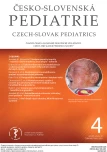-
Medical journals
- Career
Complement deficiencies II: hereditary angioedema
Authors: R. Hakl; P. Kuklínek; P. Chovancová; J. Litzman
Authors‘ workplace: Ústav klinické imunologie a alergologie, Fakultní nemocnice u sv. Anny v Brně, Lékařská fakulta Masarykovy univerzity, Brno
Published in: Čes-slov Pediat 2021; 76 (4): 218-221.
Category:
Overview
Hereditary angioedema (HAE) is a rare, hereditary disorder classified to HAE with C1 inhibitor deficiency (HAE-C1-INH) and HAE with normal C1 inhibitor level and function (HAE nC1-INH). HAE is characterized by recurrent attacks of subcutaneous or submucosal oedema. These results in a very wide clinical manifestation and a patient with HAE may visit an outpatient clinic of various specialties. The cause of oedema is uncontrolled complement and kinin system activation.
The diagnosis of HAE is based on clinical manifestation, anamnestic data and laboratory diagnostics. Treatment strategies include short-term and long-term prophylaxis and on demand treatment.
Keywords:
hereditary angioedema – Complement – C1 inhibitor
Sources
1. Farkas H, Harmat G, Füst G, et al. Clinical management of hereditary angio-oedema in children. Pediatr Allergy Immunol 2002; 13 (3): 153–161.
2. Hakl R, Kuklínek P, Kadlecová P, Litzman J. Hereditary angio-oedema with C1 inhibitor deficiency: Characteristics and diagnostic delay of Czech patients from one centre. Allergologia et Immunopathologia 2016; 44 (3): 241–245.
3. Maurer M, Magerl M, Ansotegui I, et al. The international WAO//EAACI guideline for the management of hereditary angioedema – The 2017 revision and update. Allergy 2018; 73 (8): 1575–1596.
4. Prematta MJ, Kemp JG, Gibbs JG, et al. Frequency, timing, and type of prodromal symptoms associated with hereditary angioedema attacks. Allergy Asthma Proc 2009; 30 (5): 506–511.
5. Magerl M, Germenis AE, Maas C, Maurer M. Hereditary angioedema with normal C1 inhibitor: Update on evaluation and treatment. Immunol Allergy Clin North Am 2017; 37 (3): 571–584.
6. Bork K, Wulff K, Witzke G, Hardt J. Hereditary angioedema with normal C1-INH with versus without specific F12 gene mutations. Allergy 2015; 70 (8): 1004–1012.
7. Caccia S, Suffritti C, Cicardi M. Pathophysiology of hereditary angioedema. Pediatr Allergy Immunol Pulmonol 2014; 27 (4): 159–163.
8. Nussberger J, Cugno M, Cicardi M, Agostoni A. Local bradykinin generation in hereditary angioedema. J Allergy Clin Immunol 1999; 104 (6): 1321–1322.
9. Bork K, Barnstedt SE, Koch P, Traupe H. Hereditary angioedema with normal C1-inhibitor activity in women. Lancet 2000; 356 (9225): 213–217.
10. Zuraw BL. Hereditary angioedema with normal C1 inhibitor: Four types and counting. J Allergy Clin Immunol 2018; 141 (3): 884–885.
11. Kaplan AP, Austen KF. A prealbumin activator of prekallikrein. II. Derivation of activators of prekallikrein from active Hageman factor by digestion with plasmin. J Exp Med 1971; 133 (4): 696–712.
12. Bafunno V, Firinu D, D’Apolito M, et al. Mutation of the angiopoietin-1 gene (ANGPT1) associates with a new type of hereditary angioedema. J Allergy Clin Immunol 2018; 141 (3): 1009–1017.
13. Dewald G. A missense mutation in the plasminogen gene, within the plasminogen kringle 3 domain, in hereditary angioedema with normal C1 inhibitor. Biochem Biophys Res Commun 2018; 498 (1): 193–198.
14. Bork K, Wulff K, Steinmüller-Magin L, et al. Hereditary angioedema with a mutation in the plasminogen gene. Allergy 2018; 73 (2): 442–450.
15. Tosi M. Molecular genetics of C1 inhibitor. Immunobiology 1998 Aug; 199 (2): 358–365.
16. Gompels MM, Lock RJ, Abinun M, et al. C1 inhibitor deficiency: consensus document. Clin Exp Immunol 2005; 139 (3): 379–394.
Labels
Neonatology Paediatrics General practitioner for children and adolescents
Article was published inCzech-Slovak Pediatrics

2021 Issue 4-
All articles in this issue
- EDITORIAL Vrodené poruchy imunity – najväčší učitelia modernej imunológie
- Severe combined immunodeficiency in set of patients from national institute of children’s diseases
- Combined immunodeficiencies with associated or syndromic features
- Congenital neutropenia in children
- The complement system I: innate defects of complement cascade proteins excluding hereditary angioedema
- Complement deficiencies II: hereditary angioedema
- Autoinflammatory diseases in the paediatric praxis – case series
- Ako hľadali názov choroby. Münchhausenov syndróm
- MUDr. Pavel Frühauf, CSc., emeritní primář, sedmdesátníkem
- Czech-Slovak Pediatrics
- Journal archive
- Current issue
- Online only
- About the journal
Most read in this issue- Autoinflammatory diseases in the paediatric praxis – case series
- MUDr. Pavel Frühauf, CSc., emeritní primář, sedmdesátníkem
- Congenital neutropenia in children
- The complement system I: innate defects of complement cascade proteins excluding hereditary angioedema
Login#ADS_BOTTOM_SCRIPTS#Forgotten passwordEnter the email address that you registered with. We will send you instructions on how to set a new password.
- Career

